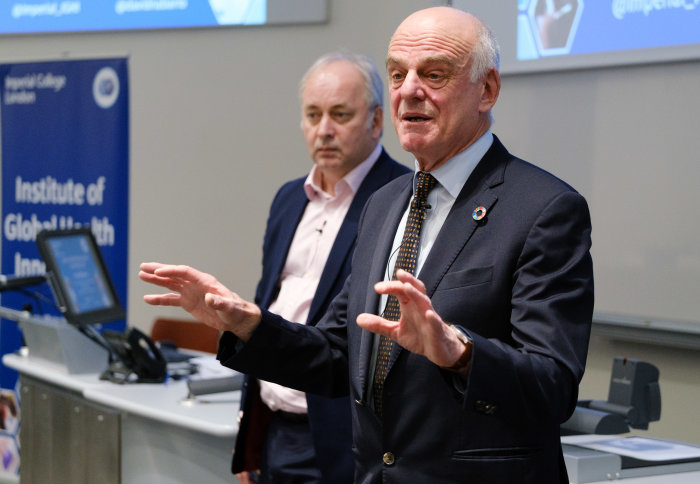The 2030 Agenda for Sustainable Development: What it means for all of us

Credit: Owen Billcliffe
The Institute of Global Health Innovation’s eighth annual lecture discusses the future of our people and planet.
Imperial College London’s Dr David Nabarro took to the floor at the Institute of Global Health Innovation’s (IGHI) annual lecture to address the pressing subject of sustainable development.

Dr Nabarro, the College’s Chair of Global Health, was welcomed by Professor the Lord Ara Darzi, Director of IGHI. Professor Darzi set the stage for a captivating talk by giving a whirlwind tour of Dr Nabarro’s colourful career to date, which includes the coveted positions of Under-Secretary-General for the United Nations and Director for Human Development in the Department for International Development.
From December 2015 to June 2017, he took on the role of Special Adviser to the UN Secretary-General for the 2030 Agenda for Sustainable Development.
Present and future
Sustainability is about meeting the needs of the present generation without compromising those of the future. And so this Agenda – agreed by world-leaders at a landmark UN Summit in 2015 – seeks to address global challenges that are holding back human and economic development, while preserving the planet. Seventeen goals were laid out as a roadmap towards achieving this ambition, spanning a range of issues including health, education, climate change and human rights.
During his impassioned talk, Dr Nabarro reflected on the Agenda’s predecessor, the Millennium Development Goals, a set of eight targets for international development established in 2000. While these focussed on poor nations, he was quick to emphasise how the 2030 Agenda is relevant for all countries. “These seventeen goals are universal; they apply to the whole world, and they’re densely interconnected.”
We don’t have another plan, and we don’t have another planet if we mess this one up. Dr David Nabarro
But the renewed plan goes further than simply widening the net. “The plan is designed to inspire collective action,” said Dr Nabarro. “It’s of use to all people, and for the regeneration of nature. And it’s the only plan that we have for the future of our world and her people. We don’t have another plan, and we don’t have another planet if we mess this one up.”
Overcoming obstacles
So what are the barriers to bringing this ambition to fruition? Although Dr Nabarro stated that 150 countries are currently using it in some way, whether actively incorporating it into their development strategies or considering how to, he doesn’t believe that’s enough. There needs to be action to get the plan more widely known and understood, he said, and support lent to countries who want to start implementing it.
But Dr Nabarro thinks that a shift in ways of working and thought patterns is required before the plan can come to life. He challenged the more traditional approaches often seen in universities, which “don’t necessarily see the value and benefit from cooperation”. He also believes that in order to make progress, leaders need to start appreciating the complexities of ‘living systems’ – from plants and animals to communities of people – and develop the unique skillset required to work with them. That includes appreciating the value of networks, encouraging unusual collaborations and interdisciplinary work.

Leaving plenty of food for thought and an audience full of captivated and pensive onlookers, Dr Nabarro rounded off his absorbing talk with an inspiring raison d’être: “We need to mobilise leaders so that generations to be are in a world that’s at least as good as what we’ve got.
“Because if we don’t do it, we’ll wreck it. And because nobody else is going to do it for us.”
As the event drew to a close, Professor Nick Jennings, Imperial’s Vice-Provost for Research and Enterprise, shared his appreciation. “It’s great to hear from people who recognise that there is only one planet, and that there is no plan b.
“Dr Nabarro gave us an exciting and visionary perspective. This was a truly outstanding lecture.”
Watch Dr Nabarro’s talk on our YouTube channel here:

Article text (excluding photos or graphics) © Imperial College London.
Photos and graphics subject to third party copyright used with permission or © Imperial College London.
Reporter
Justine Alford
Institute of Global Health Innovation